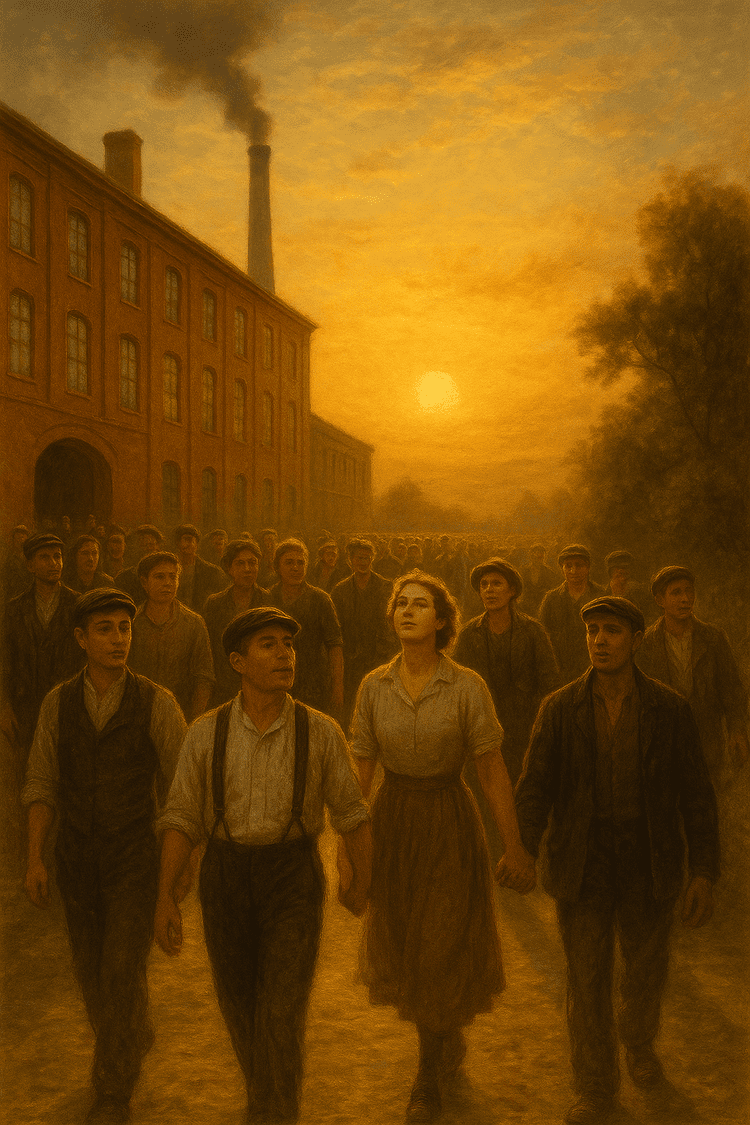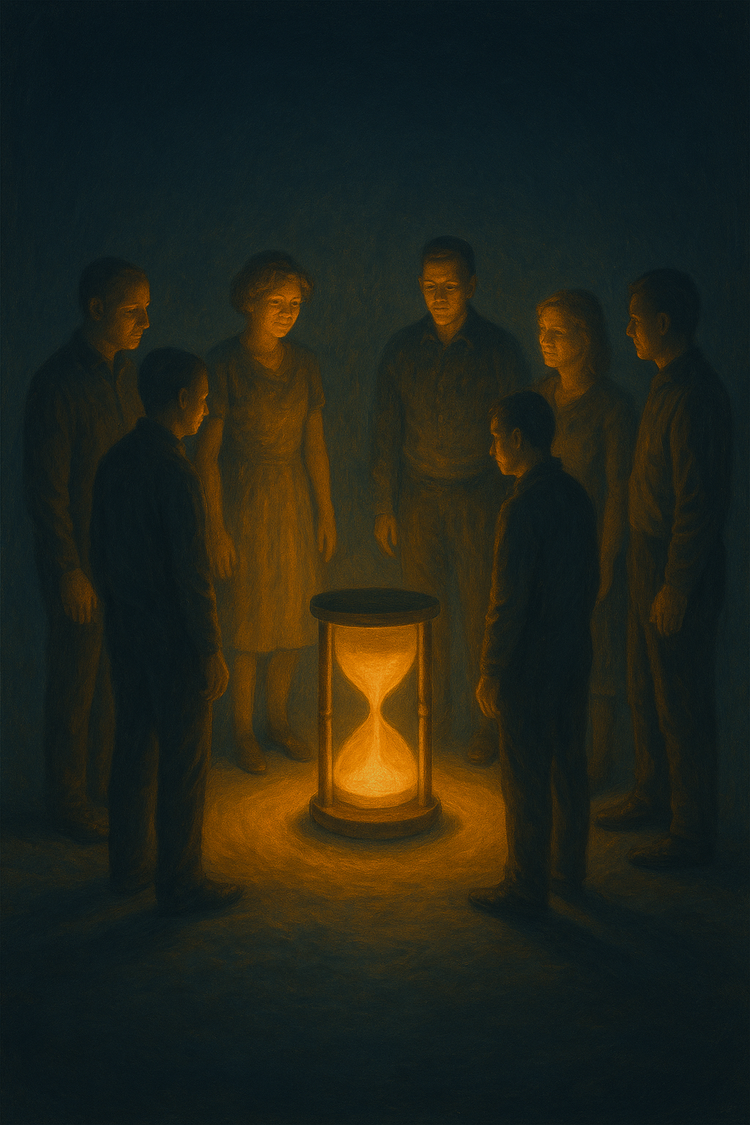Humanity’s Oldest Invention of Control

Explore more from One Humanity
Time: Humanity’s Oldest Invention of Control — and the Quiet Rebellion of the Weekend
Time: Humanity’s Oldest Invention of Control — and the Quiet Rebellion of the Weekend
by Darren Palmer
🌌 Prologue — When the Sky Guided Us

Before there was “time,” there was rhythm. The stars were not measurements but companions. People moved with the seasons—following migrations, rains, and fruiting trees—guided by what the sky revealed rather than what the clock demanded. Life was shared across the horizon: when to sow, when to rest, when to celebrate, all answered by nature itself.
Then humanity settled. Fields replaced forests; calendars replaced constellations. The rhythm that once united people with the world became a cycle of ownership—of land, labour, and hours. Where the stars had once guided action, now the harvest commanded it. The measure of life shifted from survival to output, from gratitude to gain.
Each great step forward—writing, farming, building, industry—also deepened control. The more precisely we measured the world, the more precisely we measured one another. Progress gave us structure; structure gave us hierarchy. Time became the first invisible system of power: unseen, unquestioned, universally obeyed.
Yet even within that structure, a quiet resistance remained. Across centuries, people have found ways to reclaim fragments of the rhythm that once belonged to all—in festivals, in stories, in the stillness between labours. The weekend is one such fragment: a brief return to time as it was meant to be—shared, chosen, and human.
From the first shadows cast on stone to the clang of the factory bell, our mastery of time became our measure of one another — the silent clockwork beneath every civilisation.
🕰️ 1. When Time Became Power
Time began as observation, not ownership. Early communities watched the arc of the sun, the shifting of shadows, the cycle of moons. These patterns helped them survive, but no one imagined they belonged to anyone.
That changed as societies grew larger and more complex. Rulers, priests, and astronomers realised that whoever could measure time could also command it. Calendars told people when to plant and harvest, when to pay tribute, when to appear at the temple. Prayer hours structured the day as much as devotion did.
Over centuries, the tools of measurement—sundials, water clocks, tower clocks—turned rhythms into rules. Time became a resource that could be allocated, taxed, and controlled. What began as a shared awareness slowly hardened into a system of power.
⏳ 2. The Ancient Rhythm — One Day of Rest
The seven-day week we live by emerged from Babylonian astronomy: seven visible heavenly bodies, seven days. That pattern spread and became a framework not only for counting days, but for organising life.
Judaism turned the pattern into moral law. The Sabbath—Saturday—became a commanded day of rest, a symbolic return to creation’s balance. Christianity later shifted the focus to Sunday, aligning rest with the day of resurrection and, eventually, with imperial authority.
For the first time, entire societies paused together. Yet this pause was granted from above. Rest belonged to God and crown, not to the worker. People were told when to stop, but rarely allowed to decide why. Time was still a gift that could be withdrawn.
⚙️ 3. The Industrial Revolution Changes Time

The Industrial Revolution did not just add machines to human life; it rewired humanity’s relationship with time itself. Before factories, work followed daylight and season; after them, it followed the clock.
In the early nineteenth century, many workers in Britain and the United States laboured six days a week, often for twelve to fourteen hours a day. Children were counted among the workforce. Time had become something to extract, minute by minute, like coal from the ground.
Reformers such as Robert Owen began to push back. His slogan—“Eight hours labour, eight hours recreation, eight hours rest”—was more than a timetable; it was a demand for equality of time, not just wages. If human beings were more than their productivity, their days needed to show it.
Clocks were installed in factory yards not only to coordinate shifts, but to monitor behaviour. Punctuality became a moral virtue; lateness, a failing. Even breaks and mealtimes were scheduled and supervised. Time was no longer simply measured—it was policed.
🕍 4. The First Recognisable Weekend
The first cracks in this rigid schedule appeared quietly. In Britain in 1843, a handful of factories and printing houses began closing early on Saturdays. Officially, it was a religious concession—time to wash, travel, and prepare for Sunday worship. Unofficially, it became a small taste of something dangerous: choice.
By the late nineteenth century, the idea of a Saturday half-holiday had spread. The emerging middle classes seized it as leisure. Railways sold “week-end tickets” to seaside towns; newspapers advertised week-end retreats. Rest was becoming a product as much as a principle.
The term “week-end” appeared in print in 1879 in the journal Notes and Queries, describing “the period between Saturday afternoon and Monday morning.” For many workers, that phrase was still a fantasy. But the idea—that ordinary people might claim a recurring block of time as their own—had taken root.
🇺🇸 5. The Two-Day Weekend Becomes Standard

In the United States, faith and practicality collided. Jewish workers sought Saturday for the Sabbath; Christian employers expected Sunday observance. Rather than constantly negotiate exemptions, some factories began closing for both days.
The turning point came in 1926, when Henry Ford introduced a five-day workweek at the Ford Motor Company, giving workers Saturday and Sunday off. Ford argued that people needed time to rest and to enjoy life’s blessings—but he also knew that leisure created consumers. A rested worker could build cars and then buy them.
Whatever his motives, the effect was unmistakable. Other companies followed. By the mid-twentieth century, the two-day weekend had become a standard feature of industrial life across much of the West. The system that once claimed every hour now returned two days—not out of generosity, but out of a new calculation that balanced productivity, loyalty, and profit.
📚 6. The Word “Weekend” Today
As industrial practices spread, so did the rhythm of the weekend. The hyphen slowly disappeared; “weekend” became a single, global word.
Different societies adapted it in different ways. In parts of the Middle East, the shared pause settled around Friday or Friday–Saturday, reflecting local religious rhythms. Japan blended imported calendars with its own traditions. The Soviet Union even tried to abolish the weekend altogether in 1929, introducing continuous five-day and six-day cycles so factories never stopped. The experiment failed within a decade. The human need for a collective pause proved stronger than ideology.
By the late twentieth century, the weekend was embedded in law, commerce, and culture. Fridays became thresholds. Leisure industries flourished around those two days. Yet rest was still entangled with consumption; free time was something many people could only “buy” by working the rest of the week.
💬 7. Reflection — The Reclaimed Clock
When the word “week-end” first appeared in 1879, it described a luxury enjoyed by a few. It would take decades of negotiation, activism, and industrial self-interest before it became a widespread reality.
The weekend did not dismantle the system that controlled time; it carved out a breathing space within it. Yet that space matters. It is a recurring reminder that human beings cannot be reduced to their output. For two days each week—however imperfectly protected—the clock loses some of its authority.
In the digital age, that boundary is under pressure again. Phones carry our workplaces in our pockets. Notifications blur the edges between workday and rest. Time-tracking apps and productivity dashboards measure not only what we do, but how constantly we can be reached.
The question that haunted the first factory workers has returned in a new form: do we own our time, or are we still renting it?
⚖️ 8. Equality Without Distinction — The Measure of Time Itself

From an Equality Without Distinction perspective, time is one of the clearest mirrors of how a society understands worth. Who controls it, who sells it, who is denied it—these are not only economic questions, but moral ones.
In the past, time belonged to gods and kings. Later, it belonged to factories, offices, and markets. Today, it is often claimed by systems of productivity that promise freedom while quietly measuring it.
We share more equality now than any generation before us, yet we remain servants to the same invisible master: time. The clock no longer divides us strictly by class or creed, but it still dictates what we call progress. Every tick reminds us how far we have come—and how far we have yet to go.
True equality begins when time itself serves humanity: when rest, learning, care, and creativity are no longer rationed by schedule or circumstance, but shared as a common right. When time is shared rather than owned, equality stops being a theory and becomes a rhythm again—the quiet heartbeat of a world learning, at last, to live by more than the clock.
When equality reaches the clock, every other reform becomes possible.

